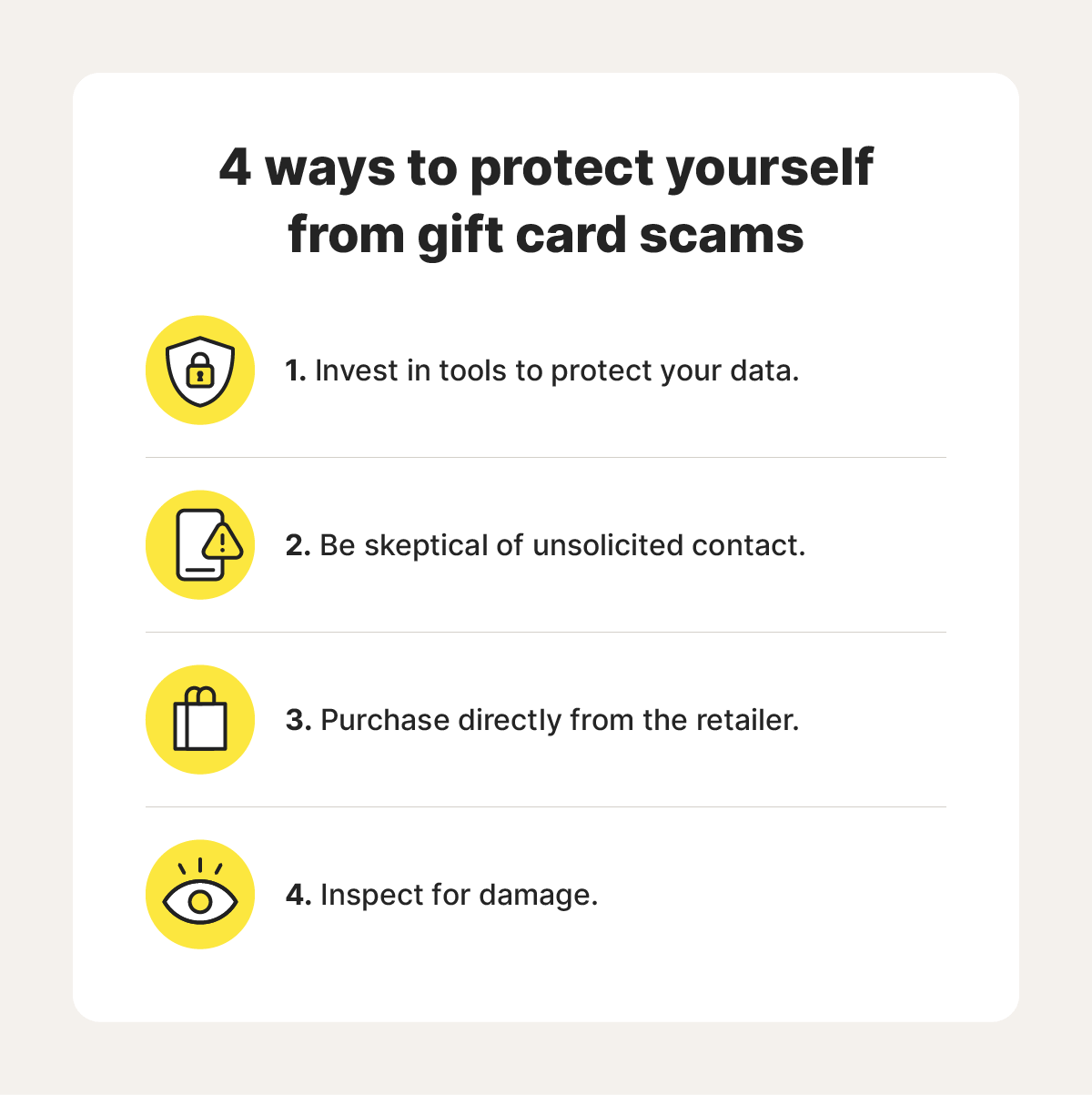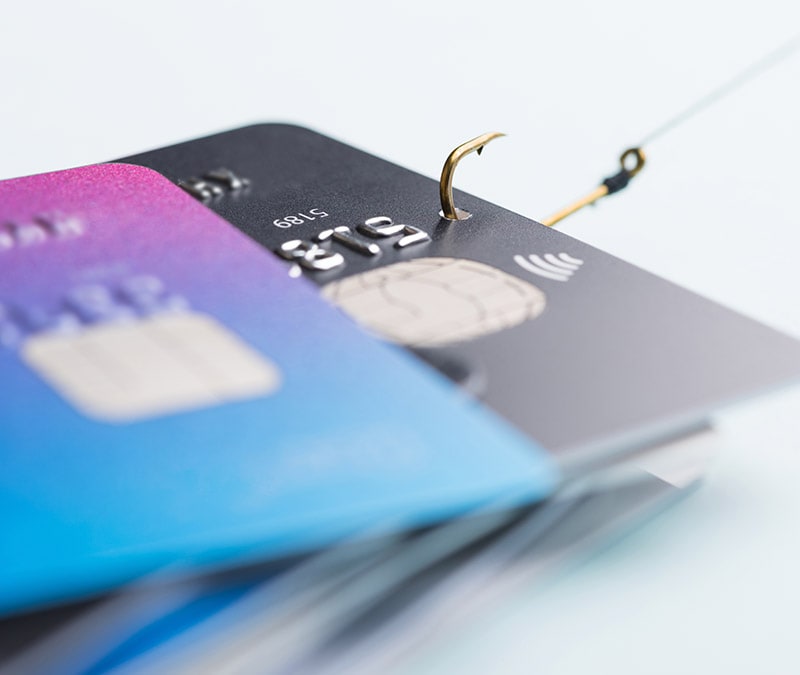9 common gift card scams and tips to avoid them
Gift card scams can begin with a phone call, email, text, or even a simple trip to the store. Discover how gift card scams work and learn about the most common types that fraudsters use to steal money. Then get Norton 360 Deluxe, which uses powerful AI-detection technology to help identify scams and protect your device and personal information.

Have you been told you’ve won a prize but need to make a gift card payment to receive it, or purchased a gift card only to discover it was empty? These are two classic examples of gift card scams — where scammers use deceptive tactics to get their hands on gift cards.
Fortunately, protecting yourself against these types of scams isn't complicated when you know what they look like. Here's a guide to some of the most common forms of gift card fraud and steps you can take to avoid them.
How do gift card scams work?
Gift card scams work by scammers tricking victims into buying a gift card and sharing the card details that scammers can then use to steal money or make purchases. Gift card scams usually begin with scammers contacting victims and claiming there’s an urgent need to send money. They then demand payment in the form of gift cards — often from popular brands like Amazon or Walmart — because they’re fast and hard to trace.
There are two main types of gift card scams: gift card payment scams and gift card draining.
In gift card payment scams, sometimes called imposter scams, cybercriminals impersonate an authority or someone trustworthy — say, a family member, tech support agent, or government official — to convince people to give gift cards away under false pretenses. The scammers will often use high-pressure tactics to get their targets to panic and prevent them from thinking clearly.
Scammers may make contact via phone, text, or email and use social engineering tactics to convince a target that:
- They haven’t paid their taxes.
- They’re behind on mortgage payments.
- They owe hundreds of dollars in speeding tickets.
- They’ve fallen behind on their utility bills.
- They have another type of debt or bill they need to pay urgently.
Gift card scammers might threaten victims that their home will be foreclosed, they’ll be sent to jail, or their power will be shut off. And the scammers may then demand that, as payment, targets send them an electronic gift card, share the number and PIN from a physical gift card, or recharge their gift card balance on a website like Amazon.
If a target falls for the scam, the scammer will be able to use the money to buy whatever they want with minimal risk of being caught, thanks to the low traceability of gift cards.
In gift card draining scams, fraudsters steal money from gift cards directly, often without ever making contact with the victim. Scammers may tamper with gift cards in stores, hack into gift card databases, or take over online accounts to spend any unused funds.
9 common types of gift card scams
There are countless variations of gift card scams and fraudsters are constantly finding new ways to exploit unsuspecting victims. Scammers often target gift cards from Amazon, Apple, Google Play, or Walmart, but where the gift card comes from matters less than how the scam is carried out.
Understanding the most common types of scams can help you spot red flags and safeguard yourself against gift card fraud.
1. IRS scam
In certain IRS scams, a fraudster will make contact via phone, text, or email claiming to work for the IRS and saying you owe unpaid taxes. They may make threats of further action if you don’t pay immediately using gift cards.
If you fall for it and purchase gift cards to pay what you “owe,” the scammer will request the card numbers and PINs so they can settle your balance. However, they’ll then break contact and be completely free to use the gift cards to make online purchases.
How to spot the scam:
- You receive a call, text, or email from the IRS about unpaid taxes.
- The person contacting you uses threatening language.
- The fake IRS agent requests that you pay owed taxes or fees with a gift card.
2. Bots scam
Some gift card scammers use bots — software designed to automate online tasks — to hack into online gift card accounts and drain unused funds from users’ gift cards.
GiftGhostBot is a prominent example, exploiting the online gift card balance check systems used by retailers. It uses brute-force attacks to scan for active cards, testing up to 1.7 million potential card numbers every hour.
Once a gift card bot finds a valid card number and PIN, scammers can sell the information on the dark web or use it to make purchases. When a legitimate customer buys the associated gift card, they’ll find that the balance has been drained, leaving the gift card worthless.
3. Cashier scam
Cashiers in retail stores can orchestrate gift card scams, using misleading and illegal tricks to steal your gift card at the point of purchase.
In this scam, the cashier activates the gift card as normal when you purchase it, but instead of handing it back after activation, they switch it with an inactive card. The cashier keeps the activated card, leaving you with one that won’t work.
How to spot the scam:
- The cashier tries to distract you during the transaction.
- The serial number on the card doesn’t match the receipt.
- The card balance is incorrect when you check it.
4. Magstripe scam
Thieves can use magstripe (magnetic stripe) readers — devices that scan, read, and store the details on the back of a plastic card — to steal gift card information. Fraudsters target stores like Walmart or Target that have gift cards on display, scan them with the reader, and then return them to the rack.
Later, they’ll call customer service to determine if any of the gift cards they scanned are activated. If they are, they can use them to make online purchases, draining the money from the cards of unsuspecting future customers.
How to spot the scam:
- The balance on your new gift card is lower than expected.
- The packaging or barcode on the gift card appears altered.
- The magnetic stripe is exposed or scratched off.
5. Online auction scam
Buying gift cards from online auction sites or gift card resellers can put you at risk of being scammed. Some scammers use these sites to sell inactive or expired gift cards. You pay for the cards — thinking you’re getting a bargain because you’re paying less than face value — only to find that they don’t work.
In other cases, scammers might misrepresent the value of gift cards they’re selling, claiming they’re worth $50 when they only have $5 left on the balance, for example.
How to spot the scam:
- The gift card is being sold on a third-party website.
- The price of the gift card is less than its face value.
- The auction site doesn’t specify a verification or refund policy for gift cards.
6. Fake prize scam
In a fake prize scam, you’ll receive a phishing email, call, or text from a scammer claiming you’ve won a trip, a new car, or a cash prize from a lottery or contest. However, they’ll say you need to pay a fee using a gift card to claim or redeem your prize.
The scammer will often instruct you to purchase a specific gift card and share the card number and PIN with them. They’re then free to break contact and spend the gift card balance online, leaving you out of pocket and without the prize you were promised.
How to spot the scam:
- You receive an unexpected call, email, or text claiming you've won a prize.
- You get contacted about a prize from a lottery or contest you never entered.
- The scammer tells you to pay a fee using a gift card to claim your prize.
7. Utility bill scam
The utility bill gift card scam involves fraudsters posing as utility representatives, claiming you owe money for gas or electricity. Even if you’ve paid your bills on time, you may receive a call demanding immediate payment to avoid disconnection. The caller will often instruct you to purchase a specific gift card to make payment and request the card details over the phone or via text or email.
How to spot the scam:
- The call is unexpected — you haven’t gotten any warnings of unpaid fees in the mail.
- You feel pressured to pay immediately to avoid losing service.
- You are asked to use an unusual payment method, like gift cards.
8. Boss scam
Some scammers may impersonate your boss or manager and send you a text or email asking for a “quick favor” that they’ll later repay. They might use urgency tactics, insisting they need gift cards for a company event or to give to a client. Once you buy the gift cards and share the numbers and PINs, the scammer drains the money.
The scammer might use a spoofed email address or hack into your boss's account to make the request seem legitimate. They may also find your LinkedIn profile to gather information about your role, company, or professional network that they can use to convince you.
How to spot the scam:
- You get a message from your boss urgently asking for a “quick favor.”
- The request involves purchasing gift cards for a company event or client gift.
- The email address looks suspicious or slightly different from your boss’s usual address.
9. Account takeovers
Fraudsters may use phishing techniques to get access to your login information for accounts on online marketplaces like Amazon.
Once they’re in, they can use verification-free one-click payment methods to purchase gift cards for themselves, which they can then use to go on an online shopping spree. Alternatively, they may spend gift cards that have already been registered to your account.
Unlike some other common Amazon scams, in an account takeover scam, you may not be able to file a chargeback with your bank if your gift card balance is drained. After all, while your gift card balance may have been stolen, money never left your bank account.
How to spot the scam:
- You get suspicious emails from a site like Amazon or Apple about changes to your login details.
- You can’t access your account using your normal login credentials.
- You notice suspicious activity in your purchase history or that your gift card balance has been wiped.
How to help protect against gift card scams
Along with the tips mentioned above for avoiding some of the most common gift card scams, there are additional precautions you can use to help protect yourself from falling victim to a scammer.


Invest in tools to protect your personal information
Norton 360 Deluxe is built on top of an industry-leading anti-malware engine, and its AI-powered scam-detection technology will help you identify scams and phishing attacks so you can avoid attacks designed to trick you into exposing sensitive personal details.
And to help reduce the chance of scammers being able to contact you in the first place, Norton 360 includes a Privacy Monitor feature that scans for your personal details on public data broker or people-search websites and helps you request to opt out. By limiting where your name, phone number, and email address can be found, you can minimize the risk that scammers can target you.
Be skeptical of unsolicited contact
If you receive an unexpected call, text, or email from a number or email address you don't recognize, ignore it. It could be a mobile scam, an email phishing attempt, or another fraud scheme. Be particularly wary if the person contacting you attempts to create a sense of urgency, pressuring you to respond quickly.
Purchase gift cards online, directly from the retailer
Avoid purchasing gift cards in person. Instead, order them directly from the retailer online. This can help you avoid in-store card-draining and online auction scams. Once you’ve purchased a gift card, use it as soon as possible to minimize the window cybercriminals have to hack into your account.
Inspect gift cards carefully
If you decide to purchase a gift card in person, check it carefully for any signs of tampering or damage. Signs that a card is compromised include scratched-off PINs or packaging that appears in poor condition. Check that the number on your gift card matches the number on your receipt.
What to do if you’ve been gift card scammed
Cybercriminals are always devising new schemes, making it difficult to keep on top of all the potential threats. If you accidentally purchased a gift card for a scammer or ended up with an empty or invalid card, follow these steps:
Report the scam to the gift card company
If you’ve fallen victim to a gift card scam, report it to the gift card company immediately. Depending on their policies, you may be reimbursed for your purchase. Here’s some guidance on how to report gift card fraud to some major gift card retailers:
- How to report Amazon gift card scams: Contact Amazon Customer Service by logging into your account and specifying that you’re having a problem with payment, charges, or gift cards.
- How to report Apple gift card scams: Contact Apple online or by calling (800) 275-2273 (say “gift cards” when prompted).
- How to report eBay gift card scams: Contact eBay customer support.
- How to report Google Play gift card scams: Contact the Google Play scam support team.
- How to report Target gift card scams: Contact Target Customer Service. You can call Target at (800) 544-2943 or email them at abuse@target.com.
Report the scam to the FTC
Next, report the scam to the Federal Trade Commission (FTC) at ReportFraud.ftc.gov. Reporting fraud can help the authorities track down scammers and reduce the likelihood of other people getting scammed in the future.
Steer clear of scammers
Understanding how gift card scams work is your first line of defense, but even the savviest individuals can fall prey to these schemes. Norton 360 Deluxe adds an extra layer of protection to your digital life with state-of-the-art Privacy Monitor and Dark Web Monitoring features.
These tools help identify where your personal information appears online and help you take steps to keep it out of the hands of cybercriminals. After all, fraudsters are less likely to scam you if they struggle to find you in the first place.
FAQs
Why do scammers want gift cards?
Scammers like gift cards because they are almost untraceable. Once the scammer has access to a gift card number and PIN, they can quickly access the funds without leaving a trail. Once the balance is used, it’s very difficult to figure out who redeemed the card and where.
Can I get my money back if I’ve been gift card scammed?
You may be able to recover your money in certain situations, but it depends on the policies of the company that issued the gift card. If you act quickly and report the scam to the company, they may be able to freeze the money or reimburse your purchase.
How do you check if a gift card has been scammed?
To check if a gift card has been scammed, follow these steps:
- Inspect the packaging for any signs of damage or tampering.
- Ask the clerk to remove the gift card from its envelope to examine the magnetic strip.
- Check the back of the card to ensure it hasn’t been torn and that the PIN numbers aren’t exposed.
- Look for any tampering with the stickers covering the barcodes.
Editorial note: Our articles provide educational information for you. Our offerings may not cover or protect against every type of crime, fraud, or threat we write about. Our goal is to increase awareness about Cyber Safety. Please review complete Terms during enrollment or setup. Remember that no one can prevent all identity theft or cybercrime, and that LifeLock does not monitor all transactions at all businesses. The Norton and LifeLock brands are part of Gen Digital Inc.









Want more?
Follow us for all the latest news, tips, and updates.